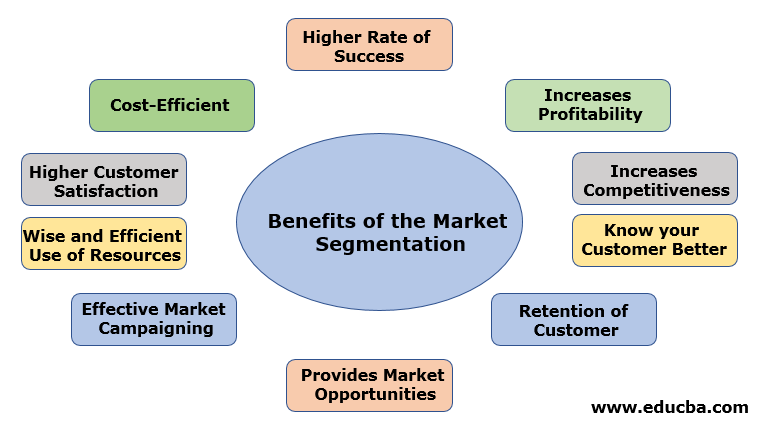Introduction to Market Segmentation
Segmentation is the process of dividing the market and the target audience based on their commonalities and homogeneity, the different attitudes of consumers towards the product(s)/service(s), distinctiveness, behavior traits, their social strata, demographic factors like age, family size, marital status, gender, and many other factors. Market segmentation business is the cornerstone of the market research and the success of any business. Market segmentation helps to segregate the consumer market and helps to identify the promising markets in which the business can flourish. It helps the marketing team in planning and organizing the marketing campaign.
The target market includes the market segments profitable to consumers and the company. Market segmentation and target marketing both serve as a beneficial techniques in saving time, money, and efforts engaged in marketing the product/services, as targeted marketing focuses on targeting the consumers or audience per different consumer habits.
It is crucial to acknowledge that without conducting prior market research and focusing on the target market, the impact of marketing efforts can become diluted. The company or the marketers tend to spend unnecessary time, money, and resources on the group of non-profitable consumer markets. Marketers and the company use market segmentation and targeting practices to create a competitive and profitable market with a higher success rate and minimal loss risks. A deeper understanding of the target market and targeted consumers assist marketers in designing, developing, organizing, and promoting products more efficiently and effectively and helps to gain the consumers’ trust in the market.
Top 10 Benefits of Market Segmentation
Given below are the top 10 benefits of the Market Segmentation:
1. Higher Rate of Success
Market segmentation means studying your market; to be more precise, it helps to divide a bigger market into smaller modules and lets the marketers know the potential of the market/consumers, which reduces the risk of loss. Thus, there are higher chances of success for the business.
2. Increases Profitability
Market segmentation is a very effective process for business, and it helps the business target particular market segments and thus helps to find better business opportunities in that particular market segment. The marketers can, thus, strategize their campaigns per the chosen market segment needs and requirements and helps to increase the business profitability. This technique lets the companies focus on one segment rather than the whole market, increasing profit.
3. Increases Competitiveness
Once the marketers and the business team have identified their focus and target market, competitiveness is the next aspect to consider. When the business clearly understands its target market, the competition intensifies. This prompts the marketing team to devise innovative ideas to promote their brand and differentiate themselves from competitors effectively. Different offers and discounts will help the marketing team to attract more consumers, and knowing your consumers better will help gain brand loyalty.
4. Retention of Customer
Retaining customers is crucial for the business, and market segmentation helps customer retention. Understanding the needs of consumers allows businesses to cater to them effectively, resulting in a better customer experience. This connection between the market brand and the product/service is particularly important in sectors such as hospitality, where customer experience plays a vital role. Consumers mostly prefer the products/services they have experienced, especially in the cases of airlines and hospitals.
5. Creates and Provides Market Opportunities
Market segmentation helps to identify and recognize potential market opportunities. The market segments where the consumers are less satisfied with the other brands are the opportunity areas for the company to focus on and to establish its brand. The companies can work in these segments and provide a better product than the existing ones, earning the consumer’s loyalty. Thus, market segmentation gives excellent market opportunities.
6. Effective Market Campaigning
As the business knows the consumers and their needs, the marketing team can customize or personalize its omnichannel marketing campaign accordingly and organize its strategies as per the need of the market, which is directly proportional to the business’s success.
7. Wise and Efficient Use of Resources
Market segmentation helps reduce unnecessary time and effort in the marketing campaign by identifying potential market areas. Thus it helps to use the company resources and money more streamlined and efficiently.
8. Higher Customer Satisfaction
Market segmentation directs or guides the company to make its marketing efforts consumer and market-oriented in a specific market segment and lets the companies serve the consumers better, increasing customer satisfaction which is the ultimate goal of the business.
9. Cost-Efficient
Efficient market research and segmentation help save a lot of useful time, money, and resources invested in the marketing campaign. Furthermore, grouping customers based on their needs, commonalities, choices, statuses, etc., makes it easier for marketers to target the audience effectively. Market segmentation facilitates a smooth and efficient campaign management process, leading to cost-effective implementation.
10. Know your Customer Better
Market segmentation helps to study the market needs and potential consumers, which reduces the risk of loss or unsuccessful marketing campaigns. Conducting market research before launching a campaign significantly increases the chances of success. Market marketers can thoroughly prepare and strategize their marketing efforts by segmenting the market. Marketers can strategize and plan their campaigns per the generic needs of the potential consumers as per the market research.
It is very important to understand what the consumer and the market demands and their actual needs. Effective marketing can be implemented only if the potential and the promising market have been identified. Else. All the efforts of marketing go in vain. Companies must always put themselves in the place of consumers first and must analyze what they would have expected out of the product/services if they had been in their shoes.
Recommended Articles
This is a guide to the Benefits of Market Segmentation. Here we discuss the introduction and the top 10 benefits of market segmentation. You can also go through our other suggested articles to learn more –




